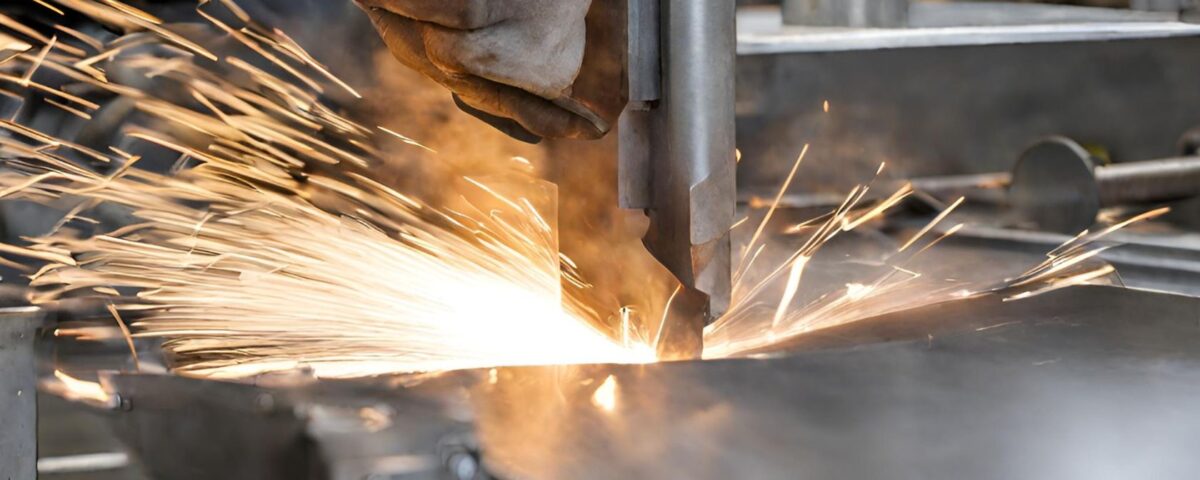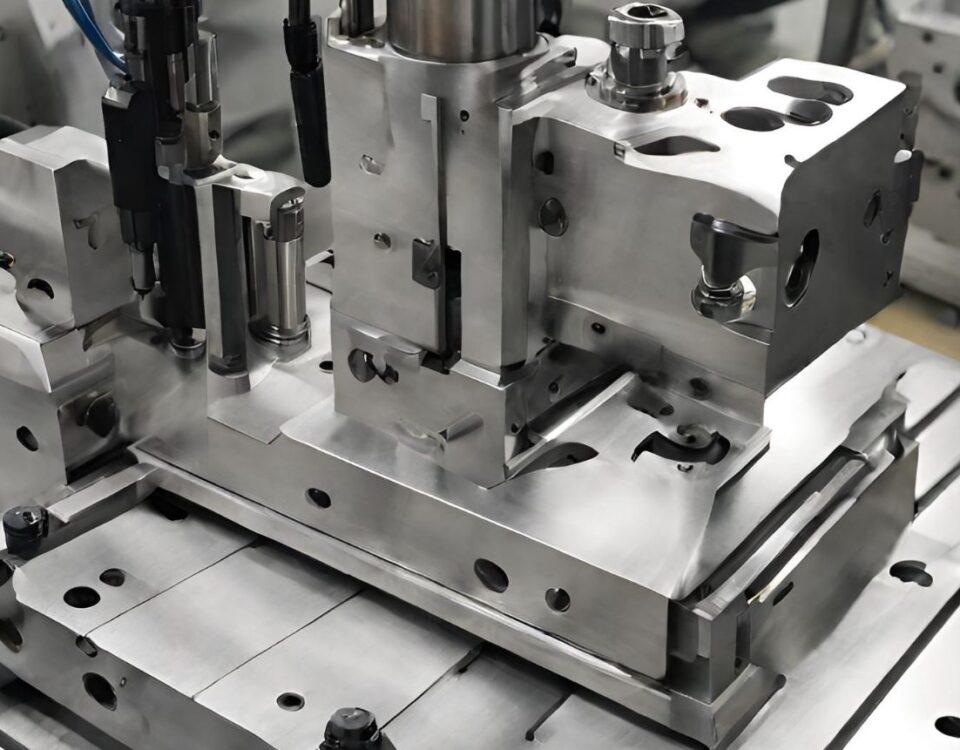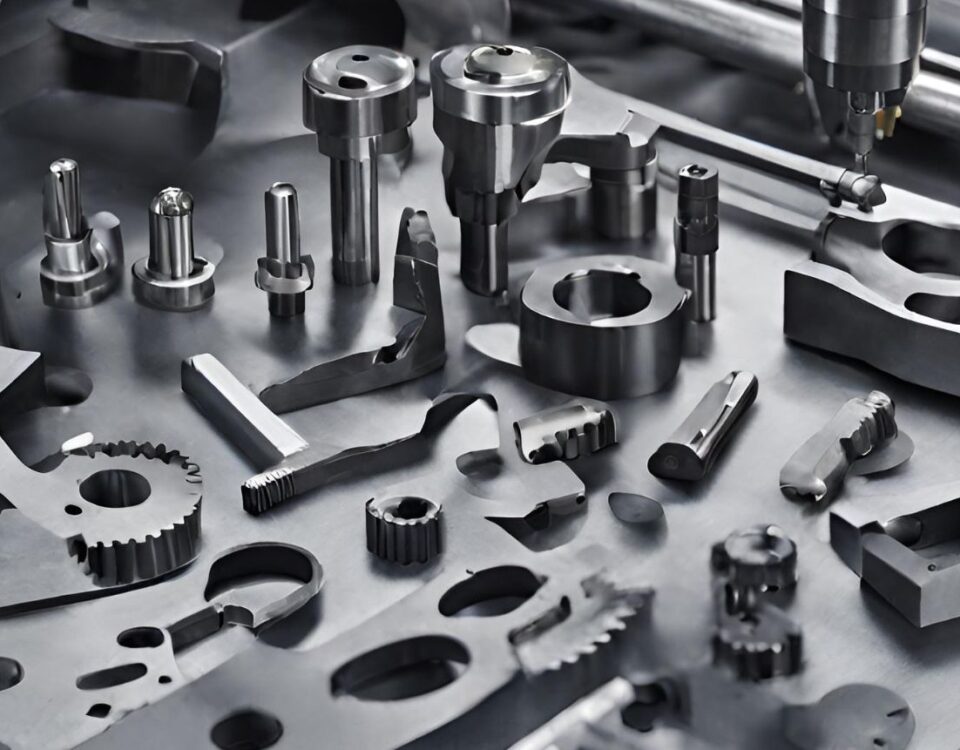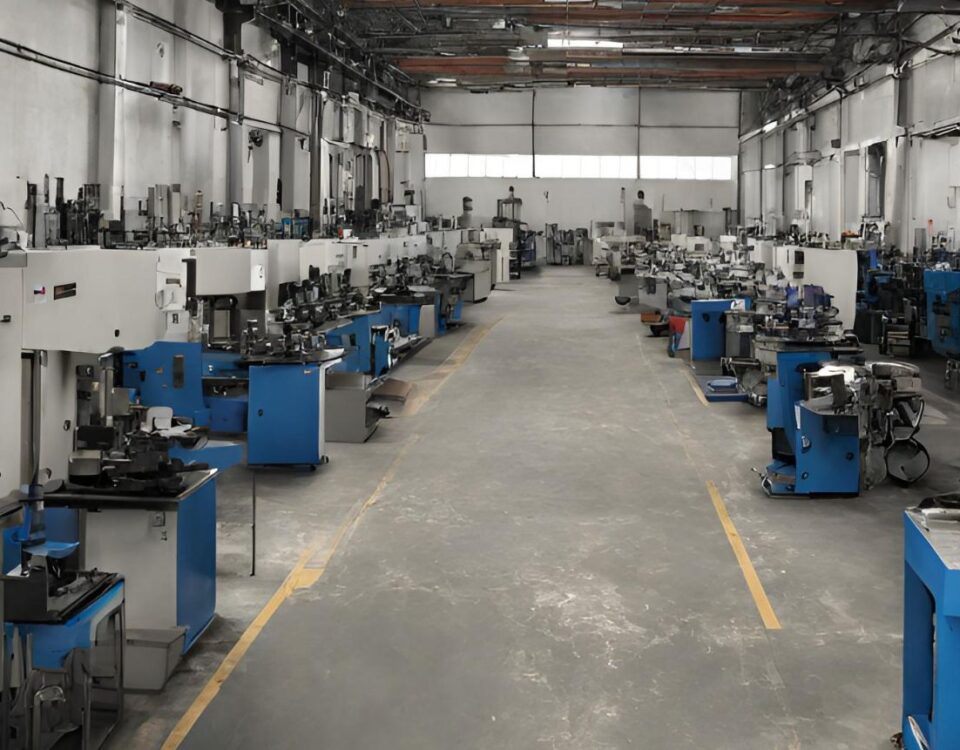
Mastering the Art of Precision Manufacturing: The Key to Flawless Products
4 March 2024
How to Choose the Best Metal Stamping Service for Your Project
6 March 2024In the constantly evolving business landscape, staying ahead of the competition is crucial. One way to achieve this is through custom metal fabrication. By leveraging this innovative manufacturing process, businesses can unlock a world of possibilities and transform their operations.
Custom metal fabrication offers versatility like no other. From designing unique products to enhancing existing ones, the options are endless. Whether you need intricate metal components or large-scale structures, this process can cater to a wide range of specifications.
By incorporating custom metal fabrication into your business, you can benefit from increased efficiency and cost savings. With the ability to create tailor-made solutions, you can optimize processes and eliminate unnecessary expenses. Moreover, the durability and strength of metal ensure longevity, reducing the need for frequent replacements.
Additionally, custom metal fabrication allows for seamless integration within various industries. Whether you're in construction, manufacturing, or automotive, this versatile process can revolutionize your business operations.
In conclusion, incorporating custom metal fabrication can be the game-changer your business needs. From enhancing product quality to optimizing processes, this transformative manufacturing process can revolutionize your operations and set you apart from the competition.
Benefits of Using Custom Metal Fabrication for Your Business
Incorporating custom metal fabrication into your business operations can yield numerous benefits, positively impacting your bottom line and overall productivity.
Firstly, custom metal fabrication allows for the creation of tailor-made solutions. Instead of relying on generic products, you can design and manufacture components or structures that perfectly align with your specific requirements. This level of customization enhances product quality, ensuring that your offerings meet the highest standards.
Additionally, custom metal fabrication can significantly improve efficiency and reduce costs. By optimizing the manufacturing process to fit your needs, you can eliminate unnecessary steps and expenses. Custom fabrication also allows for the integration of value-added features, such as built-in functionality, which can streamline your operations and reduce the need for additional components or processes.
Furthermore, the durability and strength of metal make it a cost-effective choice in the long run. Metal components are known for their longevity and resistance to wear and tear, reducing the frequency of replacements and maintenance. This durability translates to cost savings, as you will spend less on repairs or replacements over time.
Lastly, custom metal fabrication offers the opportunity to optimize material usage. With precise measurements and minimal waste, you can maximize the efficiency of your raw materials, reducing costs and environmental impact.
In conclusion, custom metal fabrication provides numerous benefits, including increased product quality, improved efficiency, cost savings, and optimized material usage.
Common Applications of Custom Metal Fabrication
Custom metal fabrication finds applications in a wide range of industries, revolutionizing various aspects of businesses across the board.
In the construction industry, custom metal fabrication plays a pivotal role in creating architectural components, structural elements, and decorative features. From intricate metalwork in high-end buildings to sturdy frameworks in industrial complexes, custom fabrication ensures that the construction process is efficient and the end result is visually striking.
Manufacturing companies also benefit greatly from custom metal fabrication. Whether it's producing specialized machinery or designing unique parts for existing equipment, custom fabrication allows manufacturers to meet the specific needs of their operations. This enhances productivity and ensures that the manufactured products meet the highest quality standards.
The automotive industry also relies heavily on custom metal fabrication. From manufacturing vehicle frames to designing specialized components, this process enables the creation of high-performance and durable automotive parts. Custom fabrication ensures that the automotive industry can keep up with the demands for innovation and efficiency.
Moreover, custom metal fabrication finds applications in industries such as aerospace, electronics, and medical equipment manufacturing. In these sectors, precision and reliability are paramount, and custom fabrication ensures that the highest standards are met.
In summary, custom metal fabrication has widespread applications across industries, including construction, manufacturing, automotive, aerospace, electronics, and medical equipment manufacturing.
Factors to Consider When Choosing a Custom Metal Fabrication Provider
Choosing the right custom metal fabrication provider is essential to ensure a successful partnership and the realization of your business goals. Here are some factors to consider when selecting a provider:
1. Experience and Expertise: Look for a provider with a proven track record and extensive experience in custom metal fabrication. A company with a deep understanding of the process and industry-specific knowledge can provide valuable insights and deliver high-quality results.
2. Capabilities and Equipment: Assess the provider's capabilities and equipment to ensure they can meet your specific requirements. Look for advanced machinery, a diverse range of materials, and the ability to handle projects of various sizes.
3. Quality Control: Quality control is crucial to ensure that the final products meet your expectations. Inquire about the provider's quality control processes, certifications, and adherence to industry standards.
4. Communication and Collaboration: Effective communication and collaboration are vital for a successful partnership. Choose a provider that values clear and prompt communication, as well as the ability to understand and address your unique needs.
5. Cost and Timelines: While cost is an important consideration, it should not be the sole deciding factor. Look for a provider that offers competitive pricing while maintaining high-quality standards. Additionally, consider their ability to meet your project timelines and deadlines.
By carefully evaluating these factors, you can select a custom metal fabrication provider that aligns with your business objectives and ensures a successful collaboration.
Steps Involved in the Custom Metal Fabrication Process
The custom metal fabrication process involves several key steps, each playing a crucial role in delivering the final product. Here is an overview of the typical steps involved:
1. Design and Planning: The process begins with a thorough understanding of your requirements. This includes design specifications, material selection, and any additional features or functionality. Working closely with the fabrication provider, you can refine the design and ensure it meets your expectations.
2. Material Selection: Once the design is finalized, the appropriate material is chosen based on factors such as strength, durability, and aesthetic appeal. The provider may offer guidance on the best material for your specific application.
3. Cutting and Shaping: The chosen material is then cut and shaped according to the design specifications. This can involve various techniques such as laser cutting, waterjet cutting, or shearing.
4. Forming and Bending: In this step, the metal is shaped into the desired form. Techniques such as bending, rolling, or stamping may be used to achieve the desired shape and dimensions.
5. Welding and Joining: If the design requires multiple components to be joined together, welding or other joining techniques are employed. This ensures structural integrity and durability.
6. Finishing and Surface Treatment: The fabricated metal components undergo finishing processes to enhance their appearance and protect against corrosion. This can include grinding, polishing, painting, or powder coating.
7. Quality Control and Inspection: Before the final product is delivered, it undergoes rigorous quality control and inspection to ensure it meets the specified requirements. This includes dimensional checks, visual inspections, and testing if necessary.
8. Delivery and Installation: Once the product passes inspection, it is carefully packaged and delivered to your location. Depending on the nature of the project, the provider may also offer installation services.
By understanding the steps involved in the custom metal fabrication process, you can better appreciate the complexity and precision required to deliver high-quality products.
Case Studies Showcasing the Transformation of Businesses Through Custom Metal Fabrication
Real-world examples can demonstrate how custom metal fabrication has transformed businesses across various industries. Here are a few case studies showcasing the power of this manufacturing process:
1. Case Study 1: Construction Industry Transformation: A construction company specializing in high-end residential projects needed a unique metal railing system for a luxury apartment building. Custom metal fabrication allowed them to create intricate and visually stunning railings that perfectly matched the architectural vision. The result was a building that stood out in the market, attracting high-profile clients and significantly increasing the company's reputation and revenue.
2. Case Study 2: Manufacturing Efficiency Enhancement: A manufacturing company struggled with a slow and inefficient assembly line due to the use of generic components. By partnering with a custom metal fabrication provider, they were able to design and manufacture specialized parts that optimized their production process. This led to a significant increase in productivity, reduced downtime, and improved overall efficiency, resulting in substantial cost savings and increased customer satisfaction.
3. Case Study 3: Automotive Innovation and Customization: An automotive customization shop aimed to differentiate itself by offering unique and personalized modifications to vehicles. By utilizing custom metal fabrication, they were able to design and manufacture custom body panels, exhaust systems, and other components. This customization capability set them apart from competitors and attracted a niche market of car enthusiasts, leading to increased revenue and a strong brand reputation.
These case studies highlight how custom metal fabrication can transform businesses by enabling unique designs, enhancing efficiency, and driving innovation and customization.
How to Incorporate Custom Metal Fabrication into Your Business Strategy
Incorporating custom metal fabrication into your business strategy requires careful planning and consideration. Here are some steps to help you successfully integrate this transformative manufacturing process:
1. Identify Opportunities: Assess your business operations and identify areas where custom metal fabrication can add value. This can include product development, improving existing components, or streamlining manufacturing processes.
2. Research Providers: Conduct thorough research to find custom metal fabrication providers that specialize in your industry and have a proven track record. Look for case studies, client testimonials, and examples of their previous work to ensure they can deliver the results you desire.
3. Collaborate and Innovate: Work closely with the fabrication provider to brainstorm ideas and optimize designs. Their expertise can help you identify innovative solutions and enhance your products or processes.
4. Evaluate Cost and ROI: Consider the cost implications of incorporating custom metal fabrication into your business. Evaluate the return on investment (ROI) by analyzing potential cost savings, increased efficiency, and improved product quality. This will help you make an informed decision about the feasibility and benefits of custom fabrication for your specific business needs.
5. Implement and Monitor: Once you have selected a fabrication provider, implement the custom metal fabrication process into your operations. Monitor the results closely, and gather feedback from your team and customers to continuously improve and refine the process.
By following these steps, you can effectively incorporate custom metal fabrication into your business strategy and harness its transformative power.
Cost Considerations and ROI of Custom Metal Fabrication
When considering custom metal fabrication, it's essential to evaluate the cost implications and potential return on investment (ROI).
The cost of custom metal fabrication can vary depending on factors such as material selection, complexity of the design, and project scale. While custom fabrication may have a higher upfront cost compared to off-the-shelf solutions, it offers long-term benefits that can outweigh the initial investment.
One significant cost advantage is the elimination of unnecessary expenses. With custom fabrication, you can optimize the manufacturing process and eliminate unnecessary steps, reducing labor costs and material waste. Additionally, the durability and longevity of metal components can lead to significant cost savings by minimizing the need for frequent replacements or repairs.
Furthermore, custom metal fabrication allows for the integration of value-added features, such as built-in functionality or improved efficiency. These enhancements can result in increased productivity, reduced downtime, and improved overall efficiency, all of which contribute to cost savings and a higher ROI.
To evaluate the ROI of custom metal fabrication, consider the potential cost savings, increased productivity, improved product quality, and enhanced customer satisfaction. By quantifying these benefits and comparing them to the initial investment, you can determine if custom fabrication is a financially viable option for your business.
In conclusion, while custom metal fabrication may come with an upfront cost, it offers long-term cost savings, increased efficiency, and improved product quality, resulting in a positive return on investment.
Conclusion: Embracing the Power of Custom Metal Fabrication for Business Success
In today's competitive business landscape, staying ahead requires innovation and strategic decision-making. Custom metal fabrication offers businesses the opportunity to transform their operations and set themselves apart from the competition.
The versatility of custom metal fabrication allows for the creation of unique products and structures that perfectly align with your specific needs. This level of customization enhances product quality, improves efficiency, and reduces costs by eliminating unnecessary steps and expenses.
Custom metal fabrication finds applications across various industries, including construction, manufacturing, automotive, aerospace, electronics, and medical equipment manufacturing. Its ability to revolutionize processes and deliver high-quality results makes it a valuable asset in today's market.
When choosing a custom metal fabrication provider, consider factors such as experience, capabilities, quality control, communication, and cost. By selecting the right partner, you can ensure a successful collaboration and achieve your business objectives.
Understanding the steps involved in the custom metal fabrication process and learning from case studies can provide valuable insights into the transformative power of this manufacturing process.
Incorporating custom metal fabrication into your business strategy requires careful planning, research, collaboration, and evaluation of cost and ROI. By following these steps, you can successfully integrate this innovative process and reap the benefits it offers.
In conclusion, embracing the power of custom metal fabrication can revolutionize your business operations, optimize processes, and set you on the path to success in today's competitive marketplace.




